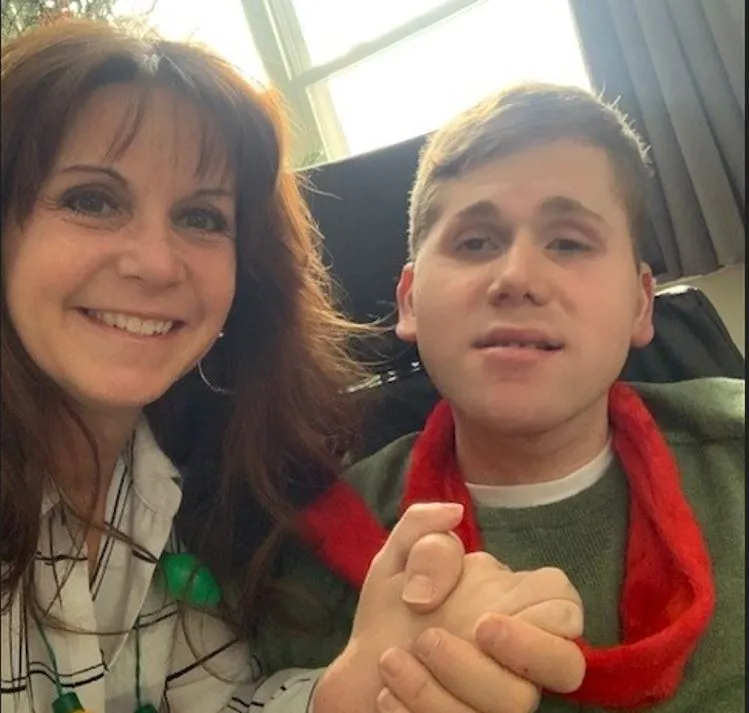Walking into a New Diagnosis
- News

What Experienced Parents Think You Should Know
For many people, the first introduction to the world of intellectual and developmental disabilities (I/DD) is being told their child has been diagnosed with a disability. Those words feel like the scariest thing in the world for many parents, but for others, they can feel like a long-awaited answer that finally explains what they already suspected.
Being new to the I/DD world can be overwhelming when you don’t know what you don’t know. What does your child’s diagnosis mean for the future? What can you do to help them? What should you be feeling? What questions should you be asking?
There is no sole source for all these answers, unfortunately. However, this article can point you in the right direction. We spoke with three parents of now-adult children with I/DD, and their insights and advice may put your mind at ease as you navigate what a new diagnosis means for your family.
The common thread through all their insights is simple: everything is going to be okay. They all acknowledged the early days are the most overwhelming, but as you learn about your child’s needs and skills, it gets easier.
Melissa Engle, workforce and community services manager at Boundless, has a 27-year-old son with autism spectrum disorder (ASD). He was diagnosed at 18 months. Engle always felt like something was different about her son compared to other children the same age. At 18 months, he wasn’t speaking yet and “something seemed off” even though his gross motor skill development was on track. His pediatrician hadn’t seemed concerned, though, so Engle convinced herself that everything was fine and she was just overreacting. By the time she convinced herself her baby was developing normally, the pediatrician had started to see evidence of ASD.
Jennifer Corcoran has a 22-year-old son, Matthew, who was diagnosed with a Dandy Walker Malformation while Corcoran was still pregnant with him. During an ultrasound at 17 weeks, the doctor saw an unusual formation between the cerebellum and the fluid-filled spaces around it. They were told there was a limited chance of their baby surviving. Corcoran recalled, “We were stunned, but I vividly remember pulling out a pen and paper from my purse. We went into discovery phase. Then I remember walking out of the building and looking around, thinking that the world is still going but it had just stopped for us.”
It's completely normal to get a little stuck in denial. Sue Ralph, Boundless board member and fellow parent, said, “There is a process of acceptance that ranges from denial to peace. I was once told that the heart accepts what the mind has a hard time grasping. I would suggest that they give themselves some grace. Time and their love for their child will help them with this struggle.”
It's also okay if you don’t get stuck in that process. “You hear it’s a loss, but I never had that at all,” said Corcoran. “Maybe if he were my only son, I would have felt that I don’t know.” She told her husband that they would still live their lives the same way as they would if they had three typical sons. Corcoran’s biggest challenge was caring for and protecting her two older sons. While she was quick to accept Matthew’s diagnosis, she never wanted to force him on her two older sons. She wanted their lives to be better because of Matthew. “I feel like I did a pretty good job, but I was scared to death of messing up my other kids.”
Engle didn’t stay in denial long either, but she still had challenges with coming to terms with the ASD diagnosis, which mostly stemmed from lack of understanding. Initially, she wanted to fix or cure her son’s autism, but was resistant to interventions because it felt like someone was intervening between her and her son. Now, of course, she knows that neither thought process is productive. There is nothing to fix with her son because his ASD is just an aspect of who he is. Interventions are valuable processes that educate everyone involved in the care of an individual, including parents.
Every parent must learn to best advocate for their child as an individual, and this is a process, too. When you’re new to something, it’s okay not to know everything. There will be things that don’t work for your child; there will be missteps, as there are with any parent. Initially, Engle knew nothing about Applied Behavioral Analysis (ABA), but it kept being brought up. So, she began to research it and decided to try it. For her son, it was an amazing therapy. For some of her friends’ children with the same diagnosis, it didn’t have the same positive outcome. While they moved on from it, Engle kept her son in it and is so thankful for the advances he made because of ABA.
From the very beginning, Corcoran pushed for Matthew to be fully included in everything. He went to a Catholic school with her other sons and was enrolled in all the normal classes with typical classmates. While he had a one-on-one aide, Corcoran never wanted her to sit with him 100% of the time. She wanted him to have the typical school experience, and that’s exactly what he got. However, Matthew wasn’t typical, so just doing school wasn’t enough. They were always in therapies including physical therapy, occupational therapy, and speech therapy. Corcoran shared that she wonders if they did enough, if more consistency in therapists would have helped Matthew.
Another common theme with all three moms is that uncertainty is an uncomfortable necessity. You won’t know if a therapy will help before you try it. You will likely always wonder if you should have done more, if you should have done something differently. As Ralph points out, though, “You know them better than anyone else, so trust yourself.” This experience is not unique to parents who have kids with an I/DD diagnosis. All parents will always have doubts, and that’s okay.
Corcoran also said, “Sometimes you have to slow down. Sometimes you have to prioritize the important things, and that doesn’t mean that you’re failing if you don’t get all hundred things done in a day. Ask one question at a time and breathe.”
Considering all the advice these three moms shared, here is a top seven list:
- #1 Do not compare your child to anyone else, whether they have a disability or not. They are their own person, and you are doing the best you can with what you have.
- #2 It’s okay if there’s grief, and it’s okay if there’s not. You are going to love your child regardless.
- #3 Find what works for your child and find what works for you. Some kids do great with ABA, some don’t. Some parents love support groups, some parents don’t. Some families turn to activism, some don’t. “There is no right way to do life,” said Engle, who changed careers because of her son. Regardless of how you do it, you will learn to best advocate for your child.
- #4 In Ralph’s words, “Make sure that the professionals that work with and teach your child understand them and are worthy of your child’s company.” There are going to be some professionals that you don’t agree with or don’t like. That’s okay. You are the parent, and it’s your responsibility to protect your child.
- #5 Find a pediatrician you trust. Engle suggested finding one who has a relative with I/DD, because in her experience, they truly understand the challenges.
- #6 Let people in. Corcoran wishes she’d let her other sons help Matthew more and included them in his life more, but in an effort to not force him on them, she always did most the work. Engle had a unique perspective. She wishes she’d maintained her pre-diagnosis friendships. At the time, she just wanted to talk about her son’s ASD and how to help him, but her friends without kids with disabilities didn’t understand that need. In hindsight, she said she should have valued those friendships and time away from the constant pressure of “being mom” more.
- #7 “Spend time with your child. Have fun. Find joy. Focus on their beautiful uniqueness,” said Ralph.





